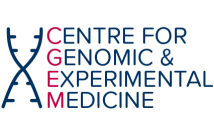Symposium: From Food to Babies: What CRISPR Can Do for You
April 2017: Experts in CRISPR technology met in Edinburgh to discuss how gene editing can change our future.

To celebrate the 5th Anniversary of the Society of Spanish Researchers in the UK (SRUK), the SRUK Scotland Constituency, led by CGEM's Dr Nerea Alonso, held a symposium to explain the relevance of CRISPR technology in our daily lives, from biomedicine to agriculture, taking into consideration crucial ethical considerations of its use.
CRISPR, a genome editing technique described by the speakers as “the most precise and efficient genome-editing tool”, has revolutionised the way scientists work and its potential is not just confined to the laboratory. Its benefits have also been adapted to a vast range of applications related to our daily lives: from treating human diseases to conferring resistance in livestock. Crucially, last year, UK scientists were granted permission to genetically modify human embryos for research and, the first CRISPR clinical trial to attack cancer cells started in the US. The symposium: “From Food to Babies: What CRISPR Can Do for You” brought together the discoverer of CRISPR technology: Prof. Francisco Martínez Mójica (University of Alicante, Spain) and other world-leading researchers in the field: Prof. Bruce Whitelaw (Roslin Institute, University of Edinburgh), Dr. Antonella Fidanza (MRC Centre for Regenerative Medicine) and Dr. Sarah Chan (Mason Institute for Medicine, Life Sciences and Law, University of Edinburgh).
Prof. Martínez Mójica's talk described the origins of CRISPR technology, explaining what sparked his passion for the unusual DNA sequences repeats present in bacteria. This led to the discovery of their immune system and to the development of a powerful technology that allows gene editing in a variety of organisms, from plant to humans. In Prof Mojica's words, “this is a fantastic time to explore the applications and possibilities of CRISPR”. As a researcher, his advice is “to take risks in your research and follow your ideas, you will be rewarded”.
Afterwards, Prof. Whitelaw spoke about the applications of CRISPR technology in new global challenges affecting livestock. In an exciting talk, he explained how genome editing could be used to protect pigs from African swine fever or to maintain genetic variation.
CRISPR is going to transform society in ways we cannot even imagine”.... we are entering the “genome re-writing” era
The strategies to direct blood cell fate though gene expression using CRISPR was the focus of Dr. Fidanza's talk. Then, Dr Chan discussed the insights of the ethics and policy regulations required to deal with genome editing of human embryos and where to draw the line between therapeutics and “genetic enhancement”.
The day ended with a round-table discussion in which the speakers and attendees had the opportunity to discuss the applications and limitations of this new technology that allows genome editing in an extremely easy, efficient and cheap way.
“Ramón Areces” Foundation, the Spanish Embassy in London, the “Spanish Foundation of Science and Technology” (FECYT), Glasgow City of Science and VWR, supported this event held at the Institute of Genetics and Molecular Medicine (IGMM), Edinburgh.
Related Links:


